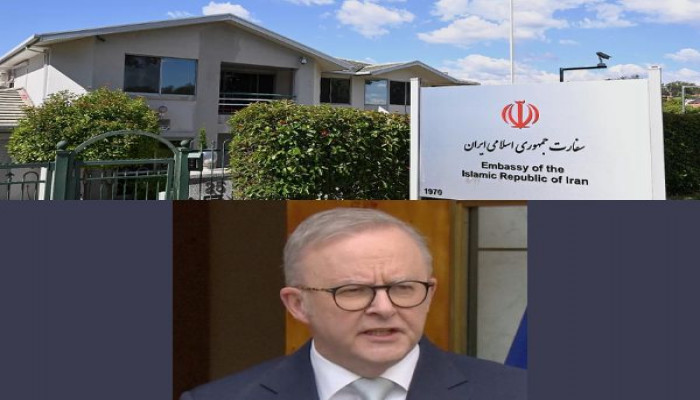Australia accuses Tehran of organising anti-semitic incidents, expels Iranian Ambassador
- In Reports
- 06:39 PM, Aug 26, 2025
- Myind Staff
Australian Prime Minister Anthony Albanese on Tuesday accused Iran of organising two antisemitic incidents in Australia and announced that diplomatic relations with Tehran were being severed in response. He said the Australian Security Intelligence Organisation had determined that the Iranian government orchestrated the arson attack on the Lewis Continental Kitchen, a kosher food business in Sydney, in October last year, and the attack on the Adass Israel Synagogue in Melbourne in December last year.
Iran has not yet issued a response.
According to Australian intelligence, Iran was behind the arson attacks at a time when antisemitic incidents in Sydney and Melbourne had risen sharply since the Israel-Hamas war began in 2023.
Australian authorities have previously said they suspected that foreign actors were paying local criminals to carry out attacks in the country.
Police have already arrested at least one suspect in the Sydney café fire case and two suspects accused of setting fire to the Melbourne synagogue.
“ASIO has now received sufficient credible intelligence to come to a profoundly troubling conclusion,” Albanese said. “The Iranian government was responsible for at least two of these attacks. Iran has attempted to mask its involvement, but ASIO believes that it was responsible for the attacks.”
“These were unprecedented and threatening acts of aggression planned by a foreign country on Australian soil,” he added. “They were efforts to destroy social cohesion and create divisions in our community. It is absolutely unacceptable.”
Shortly before the announcement, the Australian government informed Iran’s Ambassador to Australia, Ahmad Sadeghi, that he would be expelled. “Australia has also recalled our diplomats who were stationed in Iran to a third country,” Albanese stated.
A warning issued to Australians in Iran referred to the closure of the embassy and advised citizens to “seriously consider departing as soon as possible, if it is safe to do so.” It added, “Foreign nationals in Iran, including Australians and dual Australian-Iranian nationals, are at a high risk of arbitrary arrest or detention.”
Australia has now raised its travel advisory to the highest level with a “Do not travel” warning for Iran. Iran has a record of detaining Western citizens or people with overseas connections to use as leverage in negotiations.
Foreign Minister Penny Wong said Canberra would maintain limited diplomatic channels with Tehran to protect Australia’s interests. She added that this was the first time since World War II that Australia had expelled an ambassador.
Albanese also announced that Australia would legislate to add Iran’s Revolutionary Guard to its list of terrorist organisations.
Providing any form of support to listed terrorist organisations is a criminal offence in Australia. The government had previously resisted political pressure to designate the Revolutionary Guard because it is a part of the Iranian state.
Iran’s paramilitary Revolutionary Guard has long been accused of carrying out attacks abroad, though it usually denies involvement. Its Quds Force, the overseas arm, has been accused by Western governments of using militants and criminals to target dissidents and Israelis abroad.
The Executive Council of Australian Jewry welcomed the move to designate the Revolutionary Guard as a terrorist organisation. A spokesperson said the community was “outraged” that an overseas power was responsible for the attacks. “Above all, these were attacks which specifically targeted Jewish Australians, desecrated a holy house of worship, inflicted millions of dollars’ worth of damage, and left our community in fear,” the spokesperson added.
Since the beginning of the Israel-Hamas war, Israel has detained several people accused of being sponsored or encouraged by Iran to carry out vandalism and monitor potential targets.
The action against Iran came a week after Israeli Prime Minister Benjamin Netanyahu condemned Albanese as a “weak politician who had betrayed Israel” for recognising a Palestinian state.
Netanyahu’s criticism on social media followed Albanese’s 11 August announcement that his government would formalise recognition of a Palestinian state at the United Nations General Assembly in September. The move led to reciprocal cancellations of visas for Australian and Israeli officials.
Neither Albanese nor ASIO Director-General Mike Burgess gave details about the evidence linking Iran to the attacks, but Burgess said no Iranian diplomats in Australia were involved. “This was directed by the IRGC through a sequence of overseas cut-out facilitators to coordinators that found their way to tasking Australians,” Burgess stated.
Burgess added that while antisemitic incidents in Australia increased after the Israel-Hamas war began on 7 October 2023, Iran was responsible for a turning point last October when attacks directly targeted individuals, businesses and places of worship.
“Iran began the first of those,” Burgess said.







Comments